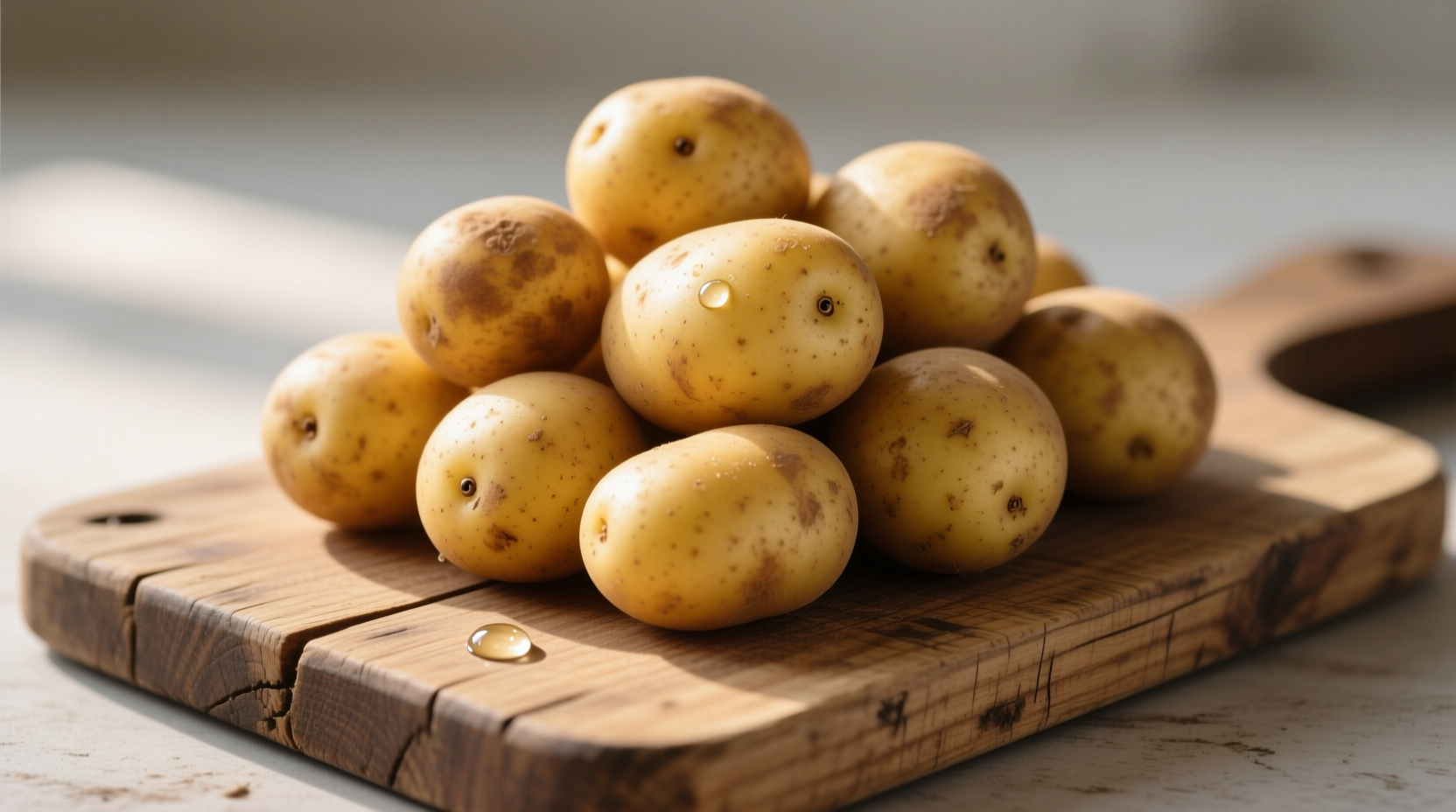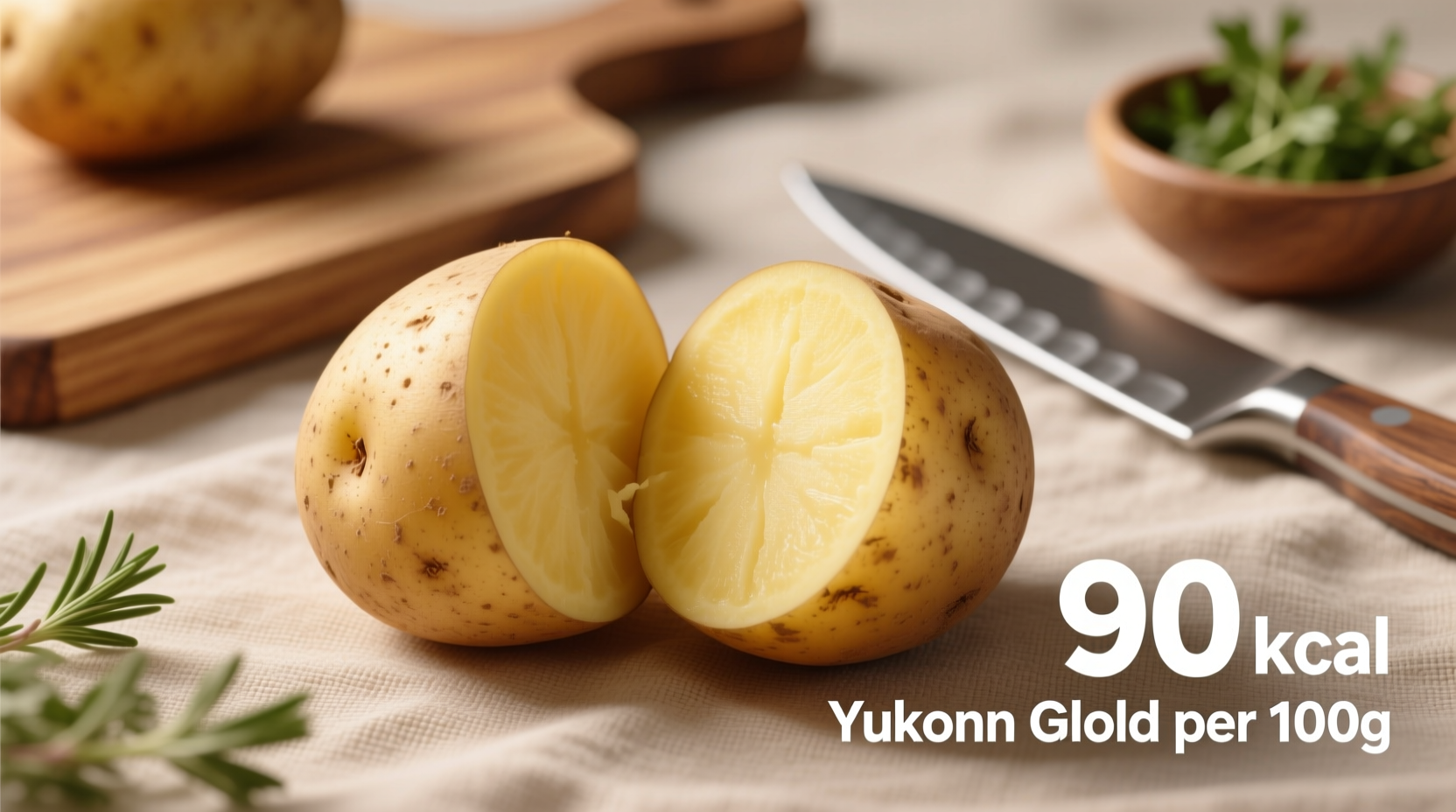When you're tracking your daily nutrition or planning balanced meals, knowing the exact calories in Yukon potato preparations matters. Unlike generic potato information that often lumps all varieties together, Yukon Golds have unique nutritional properties that set them apart from Russets and red potatoes. Let's explore the precise nutritional profile that makes this golden-fleshed potato a kitchen staple.
What Makes Yukon Gold Potatoes Different?
Developed in Canada during the 1960s, Yukon Gold potatoes feature a distinctive buttery yellow flesh and thin skin. Their naturally creamy texture and slightly sweet flavor come from a specific balance of starch and moisture. This composition directly impacts their nutritional value compared to other varieties.
Complete Nutritional Breakdown Per Serving
Understanding the full nutritional context helps you make informed dietary choices. The USDA FoodData Central database provides the most reliable nutrition information for raw Yukon Gold potatoes:
| Nutrient | Per 150g (Medium Potato) | % Daily Value* |
|---|---|---|
| Calories | 110 | 5% |
| Total Carbohydrates | 26g | 9% |
| Dietary Fiber | 2g | 8% |
| Sugars | 1g | - |
| Protein | 3g | 6% |
| Vitamin C | 27mg | 30% |
| Potassium | 535mg | 12% |
*Percent Daily Values based on a 2,000 calorie diet. Source: USDA FoodData Central, ID: 170369
How Cooking Methods Change Calorie Content
The calories in Yukon Gold potatoes vary significantly based on preparation. Understanding these differences helps you maintain dietary control:
- Boiled with skin: 110 calories per medium potato (150g)
- Baked with skin: 120 calories per medium potato
- Mashed (no additions): 125 calories per cup
- Roasted with 1 tsp olive oil: 160 calories per serving
- Fried (as home fries): 220 calories per serving
This context boundary matters because many online sources report only raw potato nutrition, creating confusion when preparing meals. The CDC's nutrition guidelines emphasize considering preparation methods when tracking food intake.

Yukon Gold vs. Other Potato Varieties: Nutritional Comparison
Not all potatoes deliver the same nutritional value. This comparison shows why Yukon Golds stand out among popular varieties:
| Potato Type | Calories (150g) | Fiber (g) | Vitamin C (%DV) | Best Uses |
|---|---|---|---|---|
| Yukon Gold | 110 | 2.0 | 30% | Mashing, roasting, boiling |
| Russet | 120 | 1.8 | 15% | Baking, frying |
| Red Potato | 100 | 2.2 | 25% | Salads, boiling |
| Sweet Potato | 135 | 3.0 | 35% | Baking, roasting |
Yukon Golds offer a nutritional sweet spot with moderate calories, good fiber content, and higher vitamin C than Russets. Their naturally buttery flavor often reduces the need for added fats during preparation.
Health Benefits Beyond Calorie Count
While tracking calories in Yukon potato matters for weight management, these potatoes offer additional health advantages:
- Potassium powerhouse: One medium Yukon Gold provides more potassium than a banana, supporting healthy blood pressure
- Vitamin C source: Contains 30% of your daily vitamin C needs, crucial for immune function and skin health
- Naturally gluten-free: A safe starch option for those with gluten sensitivities
- Resistant starch content: When cooled after cooking, they develop resistant starch that feeds beneficial gut bacteria
Smart Ways to Enjoy Yukon Gold Potatoes
Maximize nutritional benefits while managing calorie intake with these practical strategies:
- Keep the skin on: The thin skin contains valuable fiber and nutrients - just scrub well before cooking
- Cool before eating: Let cooked potatoes cool to increase resistant starch content by up to 50%
- Pair with protein: Combine with lean proteins to create balanced meals that keep you full longer
- Use healthy fats: When roasting, use 1 teaspoon of olive oil per potato instead of drowning in butter
- Control portions: Stick to one medium potato (150g) as a side dish to maintain calorie goals
Common Questions About Yukon Gold Potato Nutrition
Here are answers to frequently asked questions about Yukon Gold potato calories and nutrition:
How many calories are in a small Yukon Gold potato?
A small Yukon Gold potato (about 100g) contains approximately 70 calories when boiled with skin. This makes it an excellent portion-controlled side dish option for calorie-conscious eaters.
Do Yukon Gold potatoes have fewer calories than Russets?
Yes, Yukon Gold potatoes typically have slightly fewer calories than Russets. A medium Yukon Gold (150g) contains about 110 calories compared to 120 calories in a same-sized Russet. Yukon Golds also offer more vitamin C and a creamier texture that often requires less added fat.
Are Yukon Gold potatoes good for weight loss?
Yukon Gold potatoes can be part of a weight loss diet when prepared properly. Their moderate calorie count, fiber content, and nutrient density make them more satisfying than many refined carbohydrates. For best results, boil or roast with minimal oil, keep the skin on, and pair with lean proteins and vegetables.
How does the calorie count change when making mashed Yukon Gold potatoes?
Plain mashed Yukon Gold potatoes contain about 125 calories per cup. The calorie count increases significantly with added ingredients: using whole milk and butter adds approximately 50-75 extra calories per serving. For lower-calorie mashed potatoes, substitute milk with low-sodium vegetable broth and use just 1 teaspoon of butter per potato.
Can diabetics eat Yukon Gold potatoes?
Diabetics can include Yukon Gold potatoes in moderation as part of a balanced diet. A medium potato has a glycemic index of about 55-60, which is moderate. To minimize blood sugar impact, eat them with protein and healthy fats, keep portions to 1/2 cup mashed or 1 small potato, and consider cooling them after cooking to increase resistant starch content.











 浙公网安备
33010002000092号
浙公网安备
33010002000092号 浙B2-20120091-4
浙B2-20120091-4